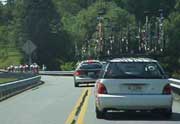Caravan Life
by Dave Arnauckas, USA Cycling Team Mechanic
 To an avid bike racing fan, sitting in a support vehicle following a major race is the best seat in the house. Although there are many highlights, you would be surprised how boring and how little of the race you see. Unless your team is in the breakaway and the commissaire allows you to move forward, don’t expect to see much of the “race”.
To an avid bike racing fan, sitting in a support vehicle following a major race is the best seat in the house. Although there are many highlights, you would be surprised how boring and how little of the race you see. Unless your team is in the breakaway and the commissaire allows you to move forward, don’t expect to see much of the “race”.
First of all, it’s hard to see the peleton from many spots in the caravan. Each team car is assigned a number and falls behind the “official” vehicles of the race. You might actually be six cars back carrying car number three. In front of you might be the Chief Commissaire, VIP’s, medical and press cars. You could be in a different time zone.
In order to see what is happening, or not happening, support staff develops an amazing ability to identify riders who appear as multicolor dots. By combining riding style, helmet, height, and jersey color, team directors can tell where riders are placed in the pack. Remember, racers, big brother is always watching.
Big Brother is not only watching, he’s listening, too. Tour radio broadcasts what is happening in both ends of the peleton. The radio doesn’t just inform the caravan who is in the breakaway and how far up the road they are. Who is setting tempo, being dropped and catching back on after a service is all transmitted in two or more languages. It helps to understand at least one of them.
So what do directors and mechanics do to keep from losing their minds? Many races are consumed by long conversations about what we, the staff, want to do after retiring from the constant travel. Boredom does overtake the mechanic. Once the race starts there isn’t much the mechanic can de except catch up on sleep. Riders have no fear: mechanics have developed the incredible ability to be sound asleep and intently listening at the same time. There are three things that will wake-up mechanics like a rude hotel wake-up call. The first is the word “crash” or your team name. Second, is the driver accelerating to the service and the third is your head hitting the front seat when the car comes to an abrupt stop. Boredom doesn’t discriminate, drivers have been known to fall asleep too.
On occasion there are accidents in caravan. Many times it’s just a gentle love tap on the bumpers, nothing big. However, one time in France the Canadian team car along with the whole caravan almost rear ended the French car performing a service. The whole caravan had just crossed a narrow bridge and were speeding to catch up. The rider had stopped on the blind side of the corner. Radio Tour alerted the caravan about the service, but a little too late for the first cars…that ended up on the sidewalk.
Passing riders can also be exciting. Moving forward to the breakaway can be a nerve-racking mission, all depending on how courteous the peleton is. Sometimes they won’t give an inch, let alone a car-width. Once at a race in France, a team car had quite a ride moving forward to the breakaway. The riders were racing into a cross wind and taking up the whole road. The whole time the Commissaire was yelling at the director to get out of the middle of the peleton.
Finally he got through only to face a one lane bridge with riders close to the bumper. The driver had very few options. Stopping to let the riders go would only have some of them run into his back end. Take the whole bridge and he would squeeze the riders out. The last and only option was to share, like Mom has always told you to do. By placing two wheels on the bridge’s sidewalk, both riders and car could get through. Needless to say placing two wheels on a sidewalk seven inches high was not a smooth experience. The car never would handle the same again.
Oh, and lets not forget mountain descents. The mechanic becomes the eyes in the back of the driver’s head. Racers descend faster than most team cars. It’s always a race to keep up with or ahead of the riders. Pro riders will hit 60 mph on Euro descents without much effort. Working your way back to the main group can be more thrilling than a roller coaster.
Every day is different in the caravan. One day you might be on the edge of your seat while the next is so slow and boring that you begin to solve complicated math problems. You just never know! So, yes if you get a chance to follow a Pro race–go for it. Every ride is a learning experience for all involved.
This article appeared in Cycling USA September 1996
